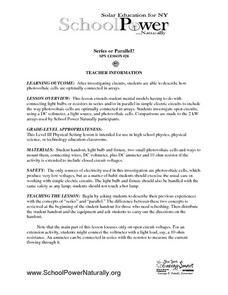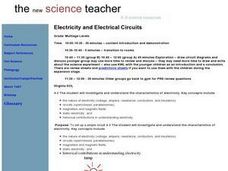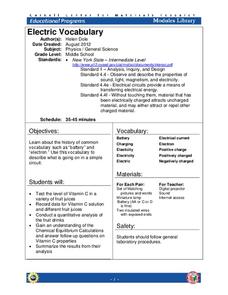Curated OER
Series Circuit
In this series circuit worksheet, students observe what happens when they make a simple circuit light more than one light bulb. Students follow 3 directions and answer 3 questions.
CK-12 Foundation
Resistor Simulation
Many scholars struggle to picture electrons traveling in a circuit but understand water going through a pipe. The simulation compares circuits to water pipes. It walks pupils through four levels of questions, allowing them to switch...
Curated OER
Earth's Energy
Students discuss the Earth's energy. In this science lesson, students construct a simple circuit, a series circuit, and a parallel circuit.
Curated OER
Electric Circuits
Fifth graders build a simple circuit which transmits Morse code using a battery, bulb, wire, switch, and tape. They analyze problems that arise while transmitting their messages to each other.
Institute of Electrical and Electronics Engineers
Series and Parallel Circuits
Learners demonstrate simple circuits and find the differences between parallel and serial circuits. In this electronic lesson plan students work in teams to test different designs using a low voltage light bulb.
Curated OER
Static Electricity
In this electricity worksheet, students read about static and current electricity and then draw pictures of an electric cell and circuits. Students draw 3 pictures total.
Curated OER
Electricity And Magnetism
Young scholars explore the relationship between magnetism and electricity byby explaining how the model motor operates. They observe the the spinning of a coil of copper wire that is part of a circuit.
Curated OER
Electricity
In this science activity, students use the clues given at the bottom of the sheet to solve the crossword puzzle on electricity. They identify a simple device that generates electricity and a substance that allows electrons to pass...
Institute of Electrical and Electronics Engineers
Insulators and Conductors
In a classic activity, emerging electricians test various objects for electrical conductivity in a circuit. Each group constructs a simple circuit by following a diagram. Predictions are made and objects are inserted into the circuit,...
Essential Energy
Being a Safety Star (Stage 3)
A spark of static electricity contains up to 3,000 volts, while a lightning strike contains around 3,000,000 volts. To understand electricity, its power, and the safety considerations relating to it learners engage in a comprehensive...
Bonneville
Using a Multimeter to Analyze a Solar Circuit: Measuring Current and Voltage—Calculating Power and Resistance
Power to the people who understand electricity. A simple experiment teaches pupils how to set up an electric circuit that includes a solar module and how to measure voltage and current using a multimeter. They calculate power and...
Curated OER
Series DC Circuits
In this electrical worksheet, students answer a series of 27 open-ended questions pertaining to DC circuits by analyzing electrical schematics. This worksheet is printable and there are on-line answers to the questions.
Curated OER
A Simple Circuit
In this circuit components learning exercise, students cut out the pictures of the circuit components. Students paste the pictures to create a simple circuit and label the pictures.
Curated OER
Series or Parallel?
Physics classes that are studying electricity connect photovoltaic cells into both series and parallel circuits. Inquiry and critical thinking come into play as learners try to determine which circuit is more productive. They associate...
Curated OER
Electricity and Electrical Circuits
Students are introduced to electricity and electrical circuits. In groups, they draw circuit diagrams, complete a KWL chart and discover the difference between open, closed and series circuits. They define new vocabulary and make...
LABScI
Circuits Lab: Lightbulbs
Electrons flow from negative to positive, but the general consensus is that current flows from positive to negative. Scholars explore current through construction of circuits in both series and parallel. The focus is on voltage,...
Curated OER
A Simple Motor
Instructions for building a simple electromagnetic motor are provided for the teacher. Aside from some sketchy background information and a list of content standards to be met, that is about all you will find in this resource. The motor...
Curated OER
Series and Parallel Circuits
Fourth graders explore electrical circuits. In this electrical circuit lesson plan, 4th graders research the history of the use of light and read a biography regarding Benjamin Franklin. Students the build basic circuits, series circuits...
Curated OER
Solid Conductors
Learners work in groups to create a solid conductor testing set up. They use a variety of solid materials and predict if each will serve as a conductor of electricity (allow electricity to pass through so the light bulb will light up)....
Cornell University
Electric Vocabulary
Practice electric vocabulary using multiple methods. Learners begin by watching a video that explains vocabulary related to electric currents. They match vocabulary cards to practice and then create an electric circuit. Using the...
CK-12 Foundation
Flashlight
In a simple circuit, does electricity start instantly? A simulation encourages thinking about the flow of electrons at a microscopic level. Pupils control the voltage, resistance, and switch in order to observe the change in both ideal...
Curated OER
What is the Underlying Causality of a Simple Circuit?
Young scholars explore simple circuitry. They compare four models of circuits and explain how each works. Students contrast the cyclic cequential and cyclic simultaneous models using a shower curtain illustration and software simulation.
Curated OER
Series/Parallel Circuits
Students engage in a instructional activity that is concerned with the concept of series and parallel circuits. They conduct research using a variety of resources. They have class discussion and the instructional activity includes...
Curated OER
Electrical Circuits
Students explore parallel and series circuits. For this electrical circuit lesson, students investigate the differences between series and parallel circuits. Students observe the benefits and drawbacks of series and parallel circuits.

























